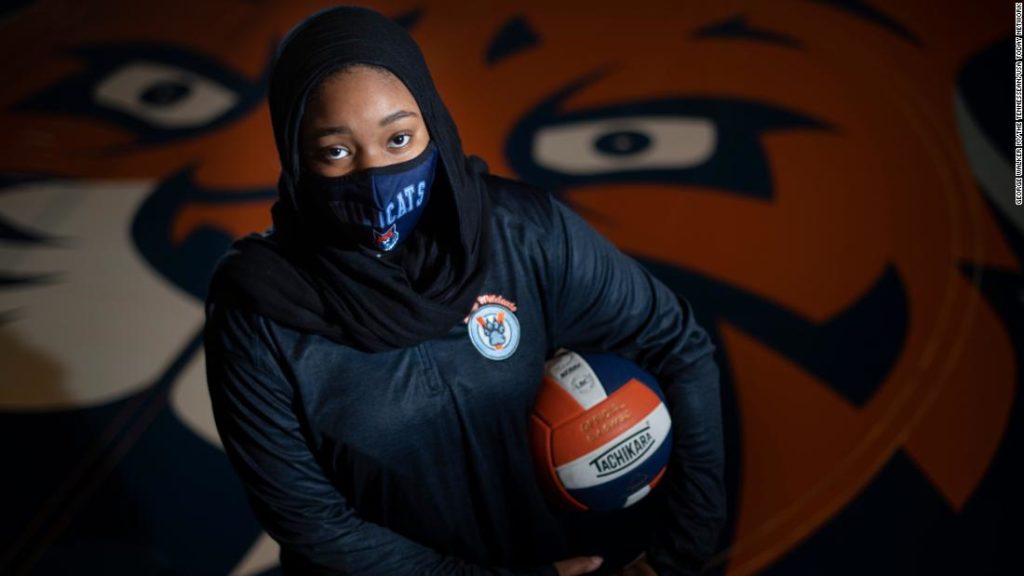Support for the rule change swelled in September after Najah Aqeel, a freshman at Valor Collegiate Prep in Nashville, Tennessee, was disqualified from a volleyball match for wearing a hijab or headscarf.
Faced with the choice to remove her hijab or sit out the match, Najah decided not to play. Most Muslim women who wear the hijab only remove it in the presence of other women or immediate family members.
“I’m really humbled and happy that I got to change the rule for volleyball players across the country,” Najah told CNN. “I hope this will make sure no one else who wears religious headwear and plays sports will have to go through what I did.”
Changing the rule
At the time of the incident, Najah said she was “angry and sad” and felt singled out for her religious beliefs.
NFHS Volleyball Rule 4-1-6 stated: “Hair devices made of soft material and no more than 3 inches wide may be worn in the hair or on the head. …” Because Najah’s hijab was much larger than the allowable 3 inches, she needed state association approval to play.
Najah and her family have worked with the TSSAA, NFHS and American Muslim Advisory Council (AMAC) to change the rule.
In October, the NFHS approved a proposal for each sport rules committee to consider that would allow players to wear religious head coverings — unless deemed a safety risk to the wearer or other participants — without prior approval from state associations.
The volleyball committee was the first to meet in 2021 and promptly approved the proposal.
Other sport rules committees will also consider the proposal. If adopted by all, it would impact most US high school sports.
“Najah’s perspective, maturity and ability to communicate define her as a model for young people everywhere. We hope that her situation serves as a reminder of the beautiful fabric of diversity that exists in our schools and society overall.”
A win for religious freedom
Sabina Mohyuddin, executive director of the American Muslim Advisory Council, hailed the rule change as a victory for religious freedom.
“The NFHS ruling is a momentous occasion and sends a clear message that Muslim girls who choose to wear the hijab don’t need permission to be a Muslim in public spaces,” Mohyuddin told CNN.
“We will keep chipping away at any policies that discriminate against our community. Najah is truly a trailblazer. I admire her courage and determination to stand up for her equitable access to sports throughout this process.”
The rule change will also impact student athletes of other religions, including Jews who wear kippahs and Sikhs who wear turbans.
Najah hopes her stand inspires student athletes of all faiths and backgrounds to continue advocating for equality in sports.
“If there is any message I could give to everyone out there in the world, don’t be afraid to follow your dreams,” Najah said. “Never be afraid to stand up for what you believe in.”
You may also like
-
UK coronavirus variant has been reported in 86 countries, WHO says
-
NASA technology can help save whale sharks says Australian marine biologist and ECOCEAN founder, Brad Norman
-
California Twentynine Palms: Explosives are missing from the nation’s largest Marine Corps base and an investigation is underway
-
Trump unhappy with his impeachment attorney’s performance, sources say
-
Lunar New Year 2021: Ushering in the Year of the Ox

